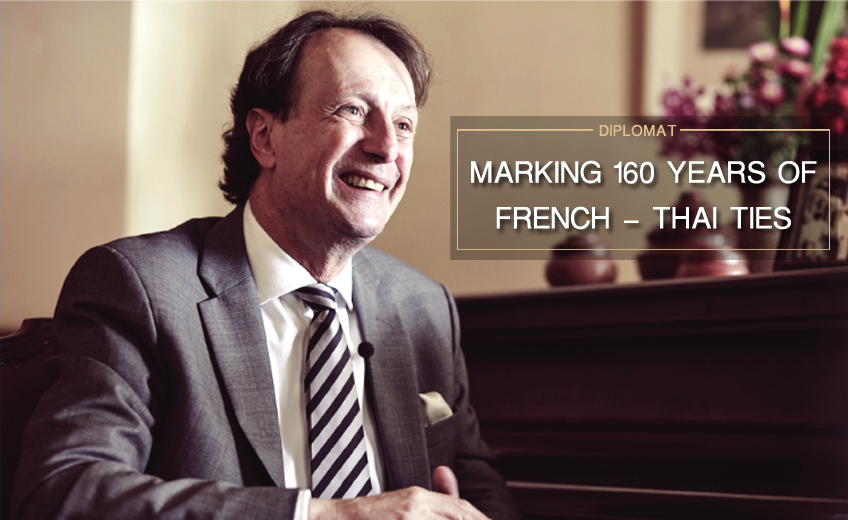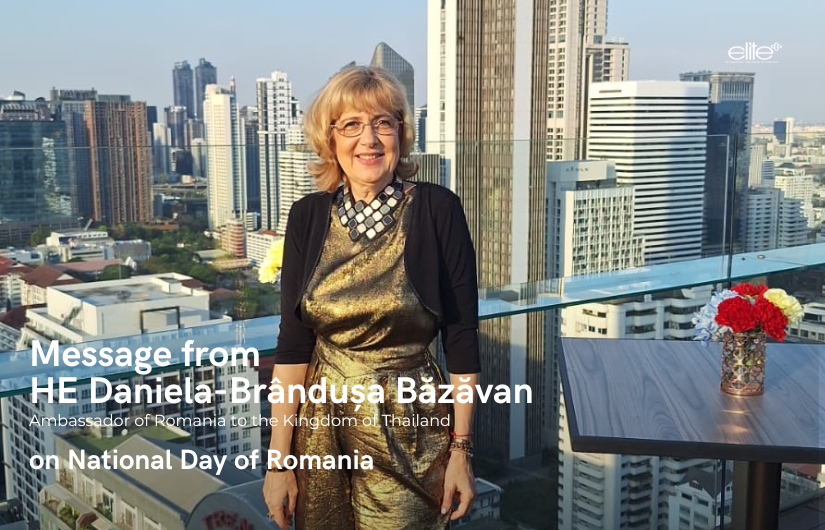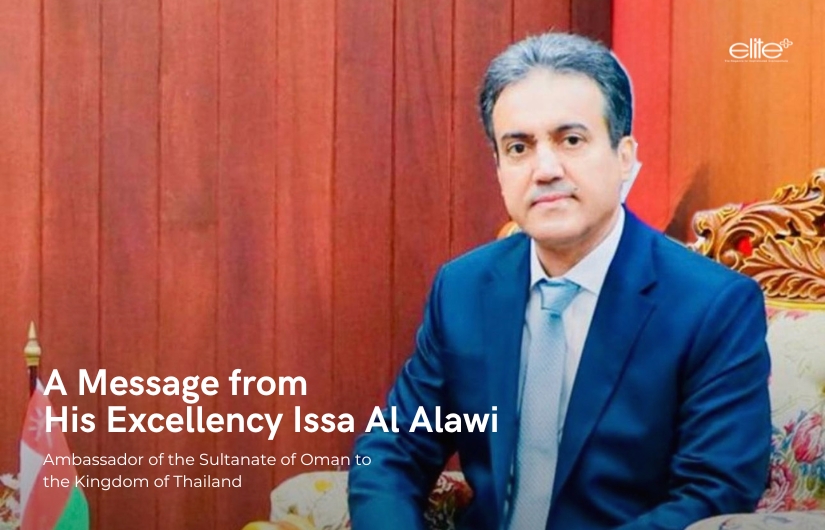France and Thailand might be on opposite ends of the world, but the relationship between the countries is closer than ever. Last year Thailand welcomed almost 740,000 French tourists, and the Land of Smiles has long been an exotic, fascinating travel destination long cherished in pop culture. In Bangkok, you’ll find a wealth of beloved French restaurants and French-Thai fusion dining.
And this year marks a new milestone in the relationship. It’s the 160th anniversary of French-Thai diplomatic ties, and a storied celebration of successful economic, cultural and political exchanges.
How to take that partnership further in a world in flux and revolutionizing is the task of His Excellency Gilles Garachon, French ambassador to Thailand. Previously the ambassador to the Philippines, the seasoned diplomat took up the Bangkok post in 2015, moving into the iconic century-old colonial-style diplomatic residence on Charoen Krung Soi 36. Since then, Ambassador Garachon, also a scholar of Asian history, has been tasked with keeping French-Thai relations up to date in a digitized world.
The ambassador has key sectors in sight: agriculture, transportation and, most importantly, a focus on improving education in both countries. According to him, knowledge and training are key to economic innovation and can lead both countries to prosperous, sustainable futures.
Elite+ sat down with Ambassador Garachon for an exclusive chat on infrastructure, development challenges and what he has planned at the halfway point of his posting in Bangkok.
- Why did you agree to become ambassador to Thailand?
I have been in Asia for more than 20 years. In fact, it is my second time in Thailand – I was posted here between 1999 and 2003. First time I was deputy, and the dream of all deputies is to become ambassador one day, so my dream came true and I have a chance to come here for a second time. I studied Asian languages, Asian civilization, and I was happy to have a chance to come to this region and especially to Thailand. Thailand is where I stayed the longest in Asia, so it’s great to be back.
- What are your policy goals?
Well, the idea of an ambassador is to help create closer relationships and my main target was to develop the relationship between Thailand and France. As you know, we had a very long-standing relationship, for 333 years since the first embassy. Your king, Phra Narai, sent an embassy to France in 1684, so this was the beginning of the relationship. We signed an agreement in 1856 and it was continuous since then, so we have a very strong relationship. We were neighbours for more than 100 years. My aim is to develop more economic ties, more cultural ties, more exchanges, so this is the target.
- What are the first three economic segments that you focus on?
In terms of economics, we have a lot of in common. My first target is agriculture. To give added value to products from agriculture is a challenge – we have to produce sophisticated products. The second sector is automotive business and the transport sector. Thailand is a regional hub so you have to continuously develop your infrastructure. We both produce cars, so this is a common sector that I want to focus on. And the third is also a common sector: tourism. Last year France sent about 730,000 French tourists to Thailand and we welcomed about 100,000 Thai tourists. It’s already a lot but we still have the capacity to increase.
- Speaking of agriculture, can you give some examples of imports and exports?
I would like to develop the export from France to Thailand of agro products. You already have French cheese, wine, quite a lot of products that you can find in Thai shops. But of course it has to go both ways; we should also welcome more Thai products. We already have a lot of Thai investments in France, especially in the fishery sector, and there is a very famous canned tuna brand, Petit Navire, which was French but now is owned by a Thai company. I think all French people have eaten some tuna from this brand. But my aim in the sector is to develop more products. We have been working with the big sugar company Mitr Phol. When you produce sugar you have a lot of by-products and you can transform those and make jelly products of sugar, and a French company is working with Mitr Phol in this. We not only work to sell our products but also to work together to develop by-products and production tools. So there are many different sectors where we can work together. Thailand is quite open to French investment and France is also open to Thai investment in any sector.
- You have been here a year and a half out of three, what else would you like to achieve, especially in economics?
Between France and Thai we already have quite substantial trade. The volume of trade is about 4 billion euros a year but we can do much better. My aim is to attract more French companies to Thailand and attract more French investment in Thailand. Large French companies are already here but as far as medium-sized companies are concerned, we can do better.
- How many French companies are in Thailand? And why you want to encourage more medium-sized companies to come?
To be precise, we have 280 French companies in Thailand and we employ about 70,000 Thai employees. You have all the French big names and a lot of them have production in Thailand, such as Michelin. A lot of people think it’s a Thai company but it’s a French-owned company and most of its production worldwide is made in Thailand.
In France we have a lot of medium-sized companies and a lot of start-ups. For large companies, it’s easy to invest abroad because they have a large number of employees and they approach foreign companies to make deals with them. For medium-sized companies, it’s difficult because often they don’t speak many foreign languages – there is a language barrier to face the world market. It’s always been a challenge for the French ambassador and trade counsellor to attract medium-sized companies because they are shy to invest and approach foreign partners, so we have to give them confidence and we have to advocate the Thai market.
- You have worked in the Philippines, Indonesia and Thailand – do you see any big differences? How can we improve our economy?
First of all, the Thai economy is very developed, very balanced. The industrial sector and the sector of services. I think you have the strongest industry in Southeast Asia. It also supports the economies of neighbouring countries such as Laos, Cambodia, Burma. Thailand is a real regional hub and very influential in Southeast Asia. You have been a very dynamic actor on the ASEAN scene for decades; for us Thailand is very important.
Of course, your country is facing some challenges as we do; challenge of education, challenge of infrastructure. We all have to develop our education system to have more manpower. We also have to constantly develop infrastructure because once you finish, you have to think about the next extension of the airport and so forth, new buildings, new railways, new subways and new highways. Thailand is facing those constant challenges.
There is also a new challenge – new systems of communication. We are in a digitalized world now. The smart city is a big issue. For example, for traffic lights we can make some kind of computerized system which calculates every detail and can put the red light, the green light at the perfect timing. We together face all those challenges now.
- How can we overcome such challenges?
We have to innovate and invest in many sectors that I mentioned, but first of all we have to invest in education, because everything starts from education. Education is a real, long-term investment. If you want to have the best engineers, the best scientists, you have to invest in education.
Then we have to innovate, such as giving added value to products. For example, you can produce wheat, rice, cereal, but all your competitors will produce the same. So innovation is the issue and things are going very fast.
For innovation you need technology, you need know-how, a lot of research. Sometimes it’s much better if we unite forces to do it together. Take the example of the Airbus consortium in Europe to produce aircraft. It’s very complicated. You need a lot of sophisticated engineers, you need a lot of new technology and lot of research, so we have to unite a few European countries – France, Germany, Spain, UK together produce those aircraft. We also produce rocket-launched satellites but it’s difficult to do this alone, so you have to unite forces.
- You are a part of the EU; we are part of ASEAN. What are the benefits of unity?
I think the achievements of ASEAN are already great. Peace has prevailed in this part of the world for decades and partly it’s because of ASEAN, because 10 members of ASEAN are meeting each other often and know each other well. Now people don’t think about tension or war. They think about peace and about development in the region. So that’s a real achievement and it’s the same for Europe. Since the creation of the European Union, we have enjoyed peace as a first achievement, and the second is that we have a common market, we have a common project. We work on many trade and development issues together. Maybe the way of management is a bit different between Europe and ASEAN but that’s quite natural. You have your own history, you have your own relationship with the different member states and in Europe it’s the same. So there is no model. All of us have to find our own way.
We are facing more and more challenges and I think it’s not enough to face those alone. We have to have more integration and we have to work more together on those issues. For ASEAN, Europe is the third partner – first is China and second is Japan. So it’s important that the relationship between the region and Europe is very strong. We have this organization called ASEM with which we work together and we still have much room for expansion.
- Does your government have long-term plans for development in Thailand?
For the education sector, there are about 600 students studying in France. Every year we send about 200 Thai students to France. We also send some French students to study in Thai universities. We have a lot of exchanges, but we plan to develop even more. Also we would like to develop the teaching of French language in Thailand.

We created the French festival in Thailand called La Fête. It was a great achievement and I will try my best to keep this alive and develop it even more. This year we are going to celebrate the 160th anniversary of diplomatic relations. We have food events and many more events about music and dance. In France we have what we call cultural diplomacy, soft power, that I think is also very important.
- Thais love to travel to Paris. It’s a dream destination. Why do French people come to Thailand and what are their favourite destinations?
The popular destinations are Chiang Mai, Phuket, Pattaya and all the islands. You have every kind of tourism. You have people who come to Thailand for cuisine, as Thai cuisine is very popular in France. People come also to discover beautiful scenery. When they go to a trip of pagoda areas, Lanna or Khon Kaen, they discover beautiful scenery too.
In 2000, we had 250,000 French tourists, now we have about 730,000 French tourists and it’s increasing every year at a rate of about 7 to 8%. People come from many different parts of France at any age, so it’s good for relations between Thailand and France.
- What do France and Thailand have in common in culture, politics and economics?
We have a lot in common. First of all, you have the word sanuk, and for us it is also the main thing in life – to enjoy life. It’s very basic. We love to enjoy life. We cherish having friends around us to enjoy nice moments, a beautiful sunrise, beautiful sunset with a nice meal, a nice beverage. If you have friends around, the pleasure is more important. We love fashion, perfume and we love to be polite and Thai people are extremely polite.
- What will be key to maintaining good relations for the next 100 years?
On the French side we have to keep on being grateful to the Thai King because this house [at the French embassy] was given to us by King Mongkut in 1857. He also gave us a large area of land where we stay until today, so we are very grateful to the Thai monarchy for that, for the friendship he showed us. King Rama IX spoke wonderful French like the most sophisticated French people can speak, and Her Majesty the Queen speaks French absolutely fluently too. So we have this long-standing relationship and it will be a basis for developing even more.
it will be a basis for developing even more. I think we have a lot to do together in the sector of soft power – cooperation between universities, between agencies, research centres and training programmes in science and art. In France, Thai start-ups are famous for using new digital technology. Thailand is prominent in Asia for that and this is well known by the young French generation. We welcome young French people who want to work in this sector.
I think the future is quite promising, but we now have to plant the seeds for tomorrow. Our job is to plant seeds just like our fathers planted a lot of seeds that we enjoy today, so we have to do the same for the next generation.





















































































































































































































































































































































































































































































































































































































































































































































































































































































































